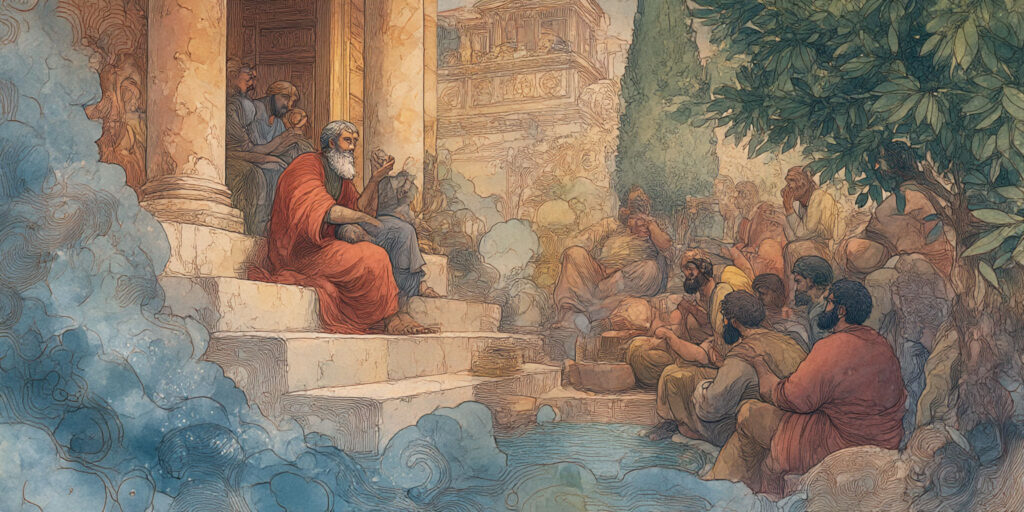
Peace
The gospel claims something bold: God offers real peace. Peace with Him, peace inside yourself, and peace with other people. But that peace isn’t automatic…

And it happened that while Apollos was at Corinth, Paul passed through the inland country and came to Ephesus. There he found some disciples. And he said to them, “Did you receive the Holy Spirit when you believed?” And they said, “No, we have not even heard that there is a Holy Spirit.” And he said, “Into what then were you baptized?” They said, “Into John’s baptism.” And Paul said, “John baptized with the baptism of repentance, telling the people to believe in the one who was to come after him, that is, Jesus.” On hearing this, they were baptized in the name of the Lord Jesus. And when Paul had laid his hands on them, the Holy Spirit came on them, and they began speaking in tongues and prophesying.
Acts 19:1-6
The book of Acts is full of excitement—miracles, conversions, and the unstoppable spread of the Gospel. But among the dramatic events and personal transformations, one passage stands out for its unique moment in church history: Acts 19:1–6. In this passage, the Apostle Paul meets a group of twelve men in Ephesus—students of John the Baptist—who have not yet received the Holy Spirit. Their story teaches us something essential: It’s possible to be close to the truth without stepping into it.
Let’s break this down.
The men Paul encounters are described as “disciples.” But that term meant something broader in the first century than how we often use it today. At the time, a disciple was simply a student—someone who followed a teacher. These twelve were likely Jewish, familiar with the Old Testament, and had been baptized by John the Baptist. They were serious, committed learners. But they were still missing something critical.
They hadn’t heard of the Holy Spirit.
Paul quickly identifies the gap. John the Baptist prepared people for Jesus, calling for repentance and pointing forward to the One who would come after him. His message was vital—but incomplete. John’s baptism was a symbol of cleansing, a preparation. But Jesus brings the fullness of salvation and the gift of the Holy Spirit.
Imagine the world outside as a noisy piazza and faith in Christ as a quiet, sacred room. John the Baptist led people out of the chaos and into the hallway—closer to God, but not yet in the room. These men in Acts 19 were in that hallway. They had left behind confusion and sin, but they had not yet entered into new life in Christ.
Paul explains the full Gospel to them. They believe, are baptized in the name of Jesus, and receive the Holy Spirit. At that moment, they step out of the hallway and into the room. They become true Christians—not by their goodness, not by their knowledge, but by surrendering to Jesus.
This moment is one of only three in Acts where people speak in tongues—glossolalia—after receiving the Spirit. Why here? Because God needed to make it unmistakably clear: these hallway followers were now fully inside the room. They were not just followers of a prophet; they were now followers of the Messiah.
Today, many believe that being a good person is enough. “I’m not that bad,” we say. But even in prisons, studies show most inmates believe they’ve done enough good to get into heaven. The problem is not how we compare to others—it’s how we stand before a holy God.
Paul knew this firsthand. He had been a Pharisee of Pharisees—moral, learned, zealous. But it wasn’t enough. Only after encountering Jesus did he realize he needed forgiveness, just like everyone else.
The world offers countless philosophies, ideologies, and religions. But Jesus said clearly: “I am the way, the truth, and the life. No one comes to the Father except through me” (John 14:6). This is not narrow-mindedness—it’s the Gospel. Salvation is not a reward for the good; it’s medicine for the sick. And all of us are sick with sin.
Imagine a remote Alaskan town stricken with a deadly disease in 1925. A relay of dog sled teams races against time through brutal cold to deliver a 20-pound package of life-saving serum. When the medicine finally arrives, no one debates its packaging. They take it—because it’s the only cure.
Jesus is that cure. The only one.
There’s a story of a little boy who desperately wanted to go to the circus. When the parade came to town, he saw animals, performers, and clowns. Overjoyed, he handed his dollar to the clown at the end of the parade and went home—never realizing the parade was just the introduction. He missed the circus entirely.
That’s what happens when we follow religion without encountering Jesus. We may appreciate the beauty, the tradition, the emotion—but miss the life-changing reality.
You may be in the hallway. You may be close. You may be familiar with Scripture, active in church, or full of good intentions. But unless you’ve had that encounter with Jesus—unless you’ve received His Spirit—you’re not yet in the room.
But here’s the good news: the door is wide open.
You don’t need to memorize the Bible. You don’t need to clean yourself up first. You simply need to say, “Jesus, I need you. Change me. Forgive me. Make me new.”
And just like those twelve men in Ephesus, you can move from the hallway into the room—from almost to completely—from lost to found.
The medicine has arrived. Will you take it?

The gospel claims something bold: God offers real peace. Peace with Him, peace inside yourself, and peace with other people. But that peace isn’t automatic…

Advent starts by asking us to slow down and look past the distractions. Every culture wraps Christmas in its own extras—traditions, shopping, decorations, sentimental ideas.

After Paul left Galatia, other teachers came. They questioned Paul’s authority and offered the Galatians a far more “comfortable” message…

Jesus leaves the synagogue in Capernaum and steps into a home. Simon Peter’s mother-in-law lies with a high fever.

Paul writes to a church he has never visited, yet he sounds like a pastor who knows them well: he encourages, challenges, and points every road back to Christ…